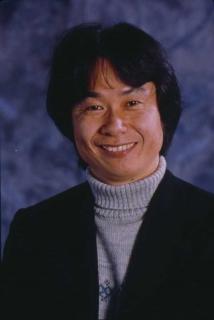Miyamoto and Iwata speak out on adult oriented gaming
Nintendo bigwigs comment on GameCube's target audience.
As part of the grand global good-will tour being carried out by Nintendo’s Iwata and Miyamoto Sans, the pair recently made some interesting comments regarding Nintendo’s take on the target age-group for its GameCube console.
Though Nintendo has repeatedly stated that it sees itself aiming for a different market than both Sony and Microsoft, it would appear that the importance of engendering support from the world’s bread-winning demographic is not lost on the company.
Question: Can you comment on the state of technology in the video game industry - where it's going and what kinds of games it will allow you to make?
Miyamoto: I think for a long time we've looked at technology and at how we can make use of it in games. In the last five to six years, there's been a lot of focus on what can be done with cutting-edge technology.
People are focusing too much on what you can do with technology, and not enough on creativity. I'm not certain that a high level of technology will necessarily make games fun and interesting.
Iwata: In the early stages of the video game industry, the technology was quite limiting. In game design, you had to find ways to stretch that technology. Now we've found ourselves with new technology, and that puts us in a much freer environment. That's great, but technology is just a tool. It's not our objective.
Q: You've talked before about how your competitors have tried to pin you down as a kiddie-oriented company with little to offer older, more mature gamers. How are you going to change that image?
Iwata: While Nintendo sells hardware, we are the biggest software publisher. We have the strongest software teams in-house. Those in-house teams have a better understanding of what entertainment is and what it needs to be to attract buyers, given the fact that it's not a necessity in daily life.
People have often attacked us for making games that they consider childish. But with games like "Mario," an adult can pick that game up and have a wonderful time.
For a long time, Nintendo's opinion is that we make games everyone can enjoy and people can judge us based on our games. Now, we've decided to make a more obvious effort to broaden our appeal with games like "Star Fox." People will see that we have software that appeals to all ages.
Q: Will you rely on your lineup to spread the message that Nintendo's not just for kids, or will you also have a broader marketing campaign to trumpet that message?
Iwata: It's not a question of one or the other. You can't just change an image with commercials. Nor can you silently put out games and expect people to just know. So it will be a combination of the two. But the one way in which Nintendo is different from the others is that we're not a company that tries to change image based on hype.
Though Nintendo has repeatedly stated that it sees itself aiming for a different market than both Sony and Microsoft, it would appear that the importance of engendering support from the world’s bread-winning demographic is not lost on the company.
Question: Can you comment on the state of technology in the video game industry - where it's going and what kinds of games it will allow you to make?
Miyamoto: I think for a long time we've looked at technology and at how we can make use of it in games. In the last five to six years, there's been a lot of focus on what can be done with cutting-edge technology.
People are focusing too much on what you can do with technology, and not enough on creativity. I'm not certain that a high level of technology will necessarily make games fun and interesting.
Iwata: In the early stages of the video game industry, the technology was quite limiting. In game design, you had to find ways to stretch that technology. Now we've found ourselves with new technology, and that puts us in a much freer environment. That's great, but technology is just a tool. It's not our objective.
Q: You've talked before about how your competitors have tried to pin you down as a kiddie-oriented company with little to offer older, more mature gamers. How are you going to change that image?
Iwata: While Nintendo sells hardware, we are the biggest software publisher. We have the strongest software teams in-house. Those in-house teams have a better understanding of what entertainment is and what it needs to be to attract buyers, given the fact that it's not a necessity in daily life.
People have often attacked us for making games that they consider childish. But with games like "Mario," an adult can pick that game up and have a wonderful time.
For a long time, Nintendo's opinion is that we make games everyone can enjoy and people can judge us based on our games. Now, we've decided to make a more obvious effort to broaden our appeal with games like "Star Fox." People will see that we have software that appeals to all ages.
Q: Will you rely on your lineup to spread the message that Nintendo's not just for kids, or will you also have a broader marketing campaign to trumpet that message?
Iwata: It's not a question of one or the other. You can't just change an image with commercials. Nor can you silently put out games and expect people to just know. So it will be a combination of the two. But the one way in which Nintendo is different from the others is that we're not a company that tries to change image based on hype.
Read More Like This

